Corporations and Business Structure: Legal Responsibilities Report
VerifiedAdded on 2022/09/01
|11
|3049
|19
Report
AI Summary
This report analyzes a case study involving SRT Pty Ltd, its shareholders, directors, and related parties, examining potential breaches of legal duties under the Corporations Act 2001. It addresses concerns regarding insolvent trading, director responsibilities, and potential liabilities for actions taken. The report explores relevant sections of the Act, including duties of care, diligence, and good faith, as well as civil penalty provisions. It examines the actions of directors, including leasing arrangements, financial transactions, and potential conflicts of interest, to determine if any legal responsibilities were breached. Furthermore, it discusses the legal consequences of such breaches, including potential penalties and disqualification of directors. Finally, the report suggests steps that the organization and its controllers could have taken to avoid or mitigate any legal responsibilities, providing a comprehensive analysis of the legal and practical aspects of corporate governance.
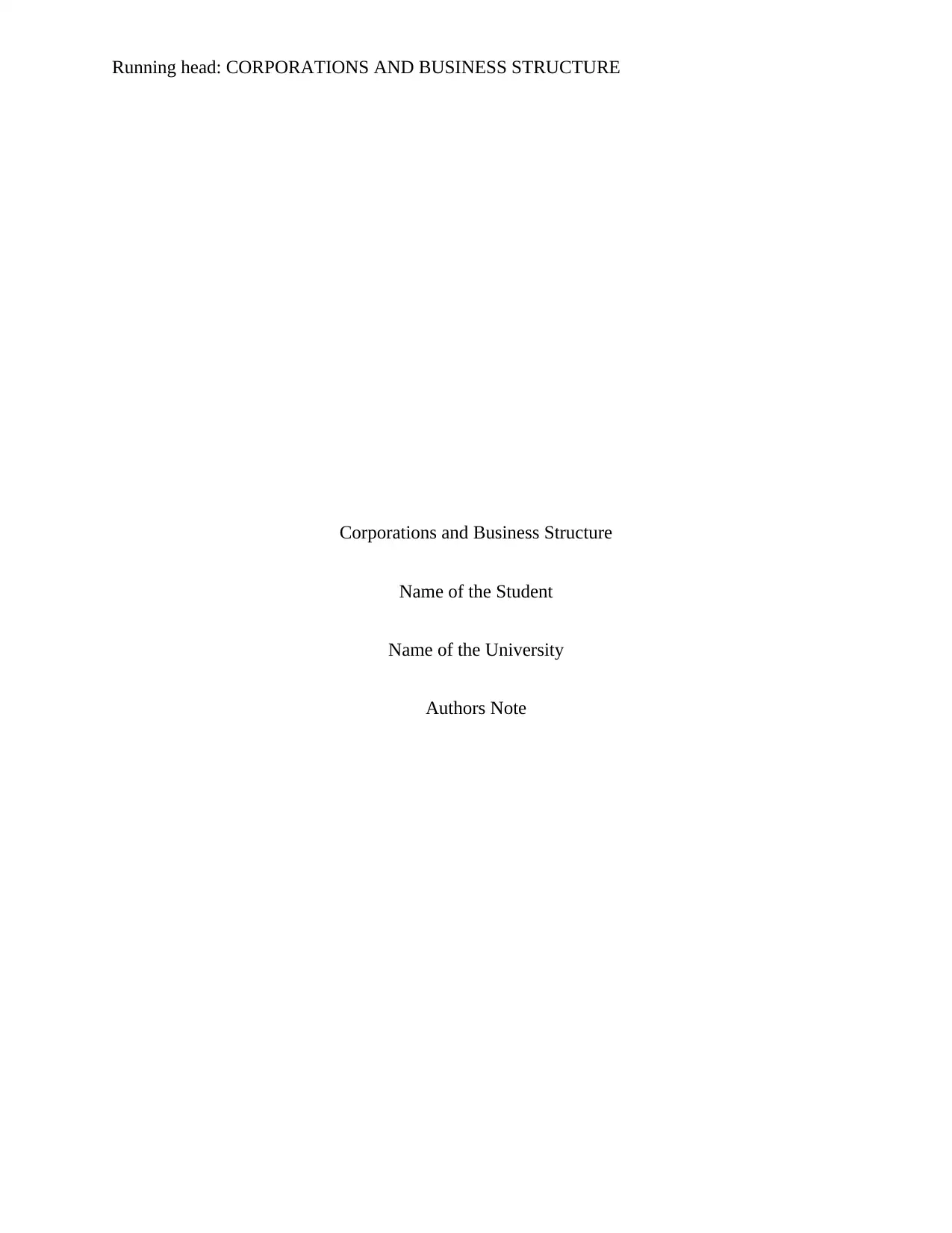
Running head: CORPORATIONS AND BUSINESS STRUCTURE
Corporations and Business Structure
Name of the Student
Name of the University
Authors Note
Corporations and Business Structure
Name of the Student
Name of the University
Authors Note
Paraphrase This Document
Need a fresh take? Get an instant paraphrase of this document with our AI Paraphraser
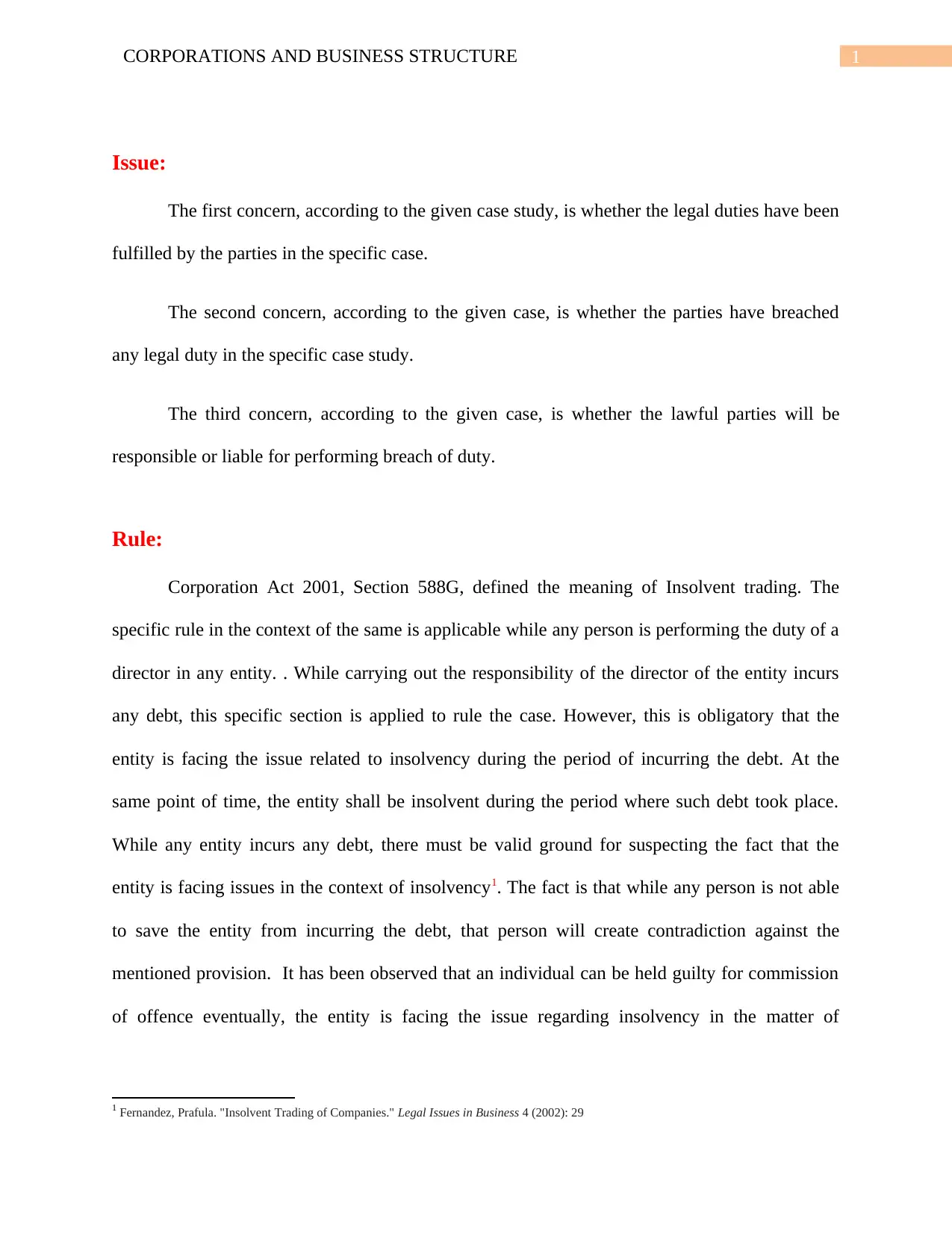
1CORPORATIONS AND BUSINESS STRUCTURE
Issue:
The first concern, according to the given case study, is whether the legal duties have been
fulfilled by the parties in the specific case.
The second concern, according to the given case, is whether the parties have breached
any legal duty in the specific case study.
The third concern, according to the given case, is whether the lawful parties will be
responsible or liable for performing breach of duty.
Rule:
Corporation Act 2001, Section 588G, defined the meaning of Insolvent trading. The
specific rule in the context of the same is applicable while any person is performing the duty of a
director in any entity. . While carrying out the responsibility of the director of the entity incurs
any debt, this specific section is applied to rule the case. However, this is obligatory that the
entity is facing the issue related to insolvency during the period of incurring the debt. At the
same point of time, the entity shall be insolvent during the period where such debt took place.
While any entity incurs any debt, there must be valid ground for suspecting the fact that the
entity is facing issues in the context of insolvency1. The fact is that while any person is not able
to save the entity from incurring the debt, that person will create contradiction against the
mentioned provision. It has been observed that an individual can be held guilty for commission
of offence eventually, the entity is facing the issue regarding insolvency in the matter of
1 Fernandez, Prafula. "Insolvent Trading of Companies." Legal Issues in Business 4 (2002): 29
Issue:
The first concern, according to the given case study, is whether the legal duties have been
fulfilled by the parties in the specific case.
The second concern, according to the given case, is whether the parties have breached
any legal duty in the specific case study.
The third concern, according to the given case, is whether the lawful parties will be
responsible or liable for performing breach of duty.
Rule:
Corporation Act 2001, Section 588G, defined the meaning of Insolvent trading. The
specific rule in the context of the same is applicable while any person is performing the duty of a
director in any entity. . While carrying out the responsibility of the director of the entity incurs
any debt, this specific section is applied to rule the case. However, this is obligatory that the
entity is facing the issue related to insolvency during the period of incurring the debt. At the
same point of time, the entity shall be insolvent during the period where such debt took place.
While any entity incurs any debt, there must be valid ground for suspecting the fact that the
entity is facing issues in the context of insolvency1. The fact is that while any person is not able
to save the entity from incurring the debt, that person will create contradiction against the
mentioned provision. It has been observed that an individual can be held guilty for commission
of offence eventually, the entity is facing the issue regarding insolvency in the matter of
1 Fernandez, Prafula. "Insolvent Trading of Companies." Legal Issues in Business 4 (2002): 29
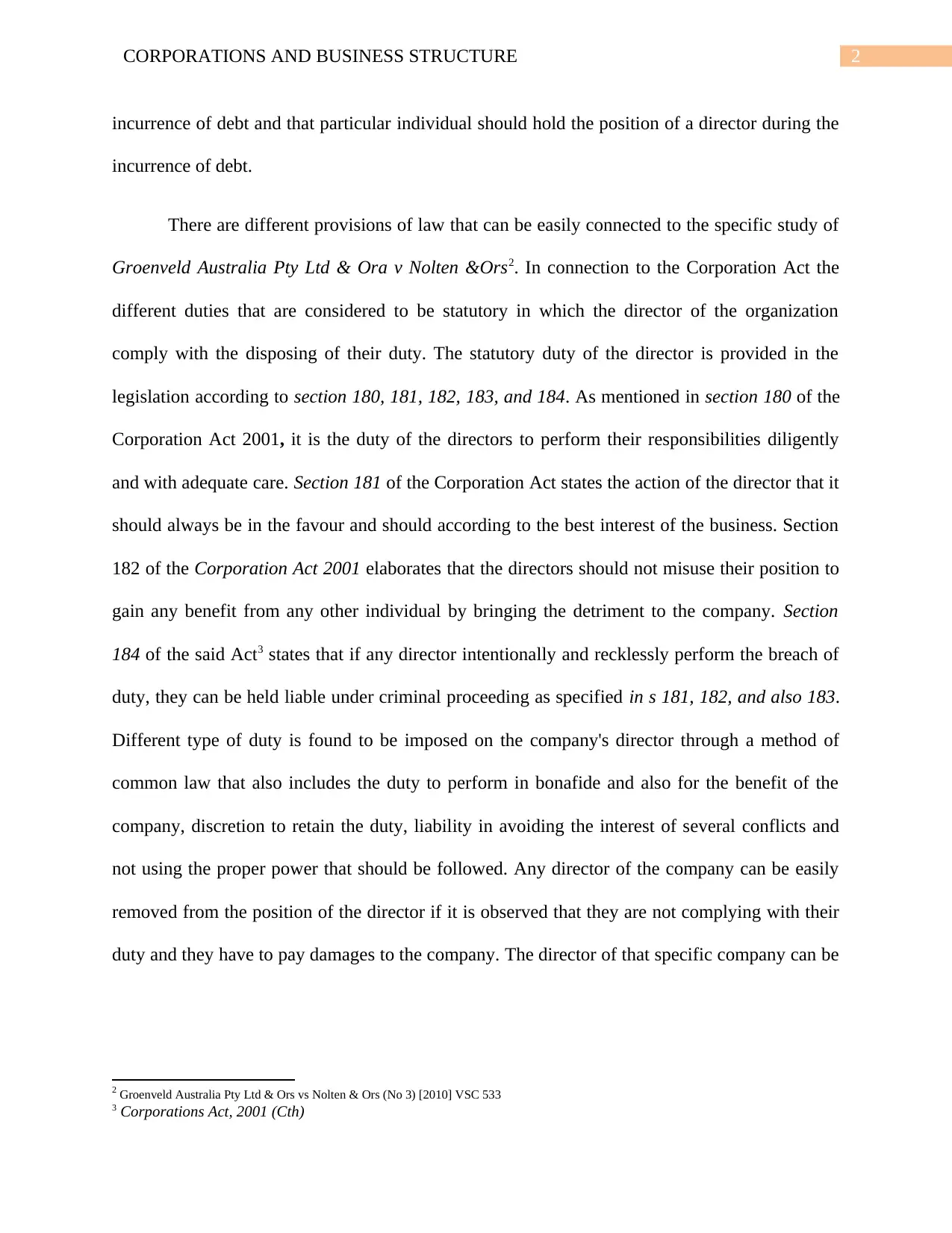
2CORPORATIONS AND BUSINESS STRUCTURE
incurrence of debt and that particular individual should hold the position of a director during the
incurrence of debt.
There are different provisions of law that can be easily connected to the specific study of
Groenveld Australia Pty Ltd & Ora v Nolten &Ors2. In connection to the Corporation Act the
different duties that are considered to be statutory in which the director of the organization
comply with the disposing of their duty. The statutory duty of the director is provided in the
legislation according to section 180, 181, 182, 183, and 184. As mentioned in section 180 of the
Corporation Act 2001, it is the duty of the directors to perform their responsibilities diligently
and with adequate care. Section 181 of the Corporation Act states the action of the director that it
should always be in the favour and should according to the best interest of the business. Section
182 of the Corporation Act 2001 elaborates that the directors should not misuse their position to
gain any benefit from any other individual by bringing the detriment to the company. Section
184 of the said Act3 states that if any director intentionally and recklessly perform the breach of
duty, they can be held liable under criminal proceeding as specified in s 181, 182, and also 183.
Different type of duty is found to be imposed on the company's director through a method of
common law that also includes the duty to perform in bonafide and also for the benefit of the
company, discretion to retain the duty, liability in avoiding the interest of several conflicts and
not using the proper power that should be followed. Any director of the company can be easily
removed from the position of the director if it is observed that they are not complying with their
duty and they have to pay damages to the company. The director of that specific company can be
2 Groenveld Australia Pty Ltd & Ors vs Nolten & Ors (No 3) [2010] VSC 533
3 Corporations Act, 2001 (Cth)
incurrence of debt and that particular individual should hold the position of a director during the
incurrence of debt.
There are different provisions of law that can be easily connected to the specific study of
Groenveld Australia Pty Ltd & Ora v Nolten &Ors2. In connection to the Corporation Act the
different duties that are considered to be statutory in which the director of the organization
comply with the disposing of their duty. The statutory duty of the director is provided in the
legislation according to section 180, 181, 182, 183, and 184. As mentioned in section 180 of the
Corporation Act 2001, it is the duty of the directors to perform their responsibilities diligently
and with adequate care. Section 181 of the Corporation Act states the action of the director that it
should always be in the favour and should according to the best interest of the business. Section
182 of the Corporation Act 2001 elaborates that the directors should not misuse their position to
gain any benefit from any other individual by bringing the detriment to the company. Section
184 of the said Act3 states that if any director intentionally and recklessly perform the breach of
duty, they can be held liable under criminal proceeding as specified in s 181, 182, and also 183.
Different type of duty is found to be imposed on the company's director through a method of
common law that also includes the duty to perform in bonafide and also for the benefit of the
company, discretion to retain the duty, liability in avoiding the interest of several conflicts and
not using the proper power that should be followed. Any director of the company can be easily
removed from the position of the director if it is observed that they are not complying with their
duty and they have to pay damages to the company. The director of that specific company can be
2 Groenveld Australia Pty Ltd & Ors vs Nolten & Ors (No 3) [2010] VSC 533
3 Corporations Act, 2001 (Cth)
⊘ This is a preview!⊘
Do you want full access?
Subscribe today to unlock all pages.

Trusted by 1+ million students worldwide
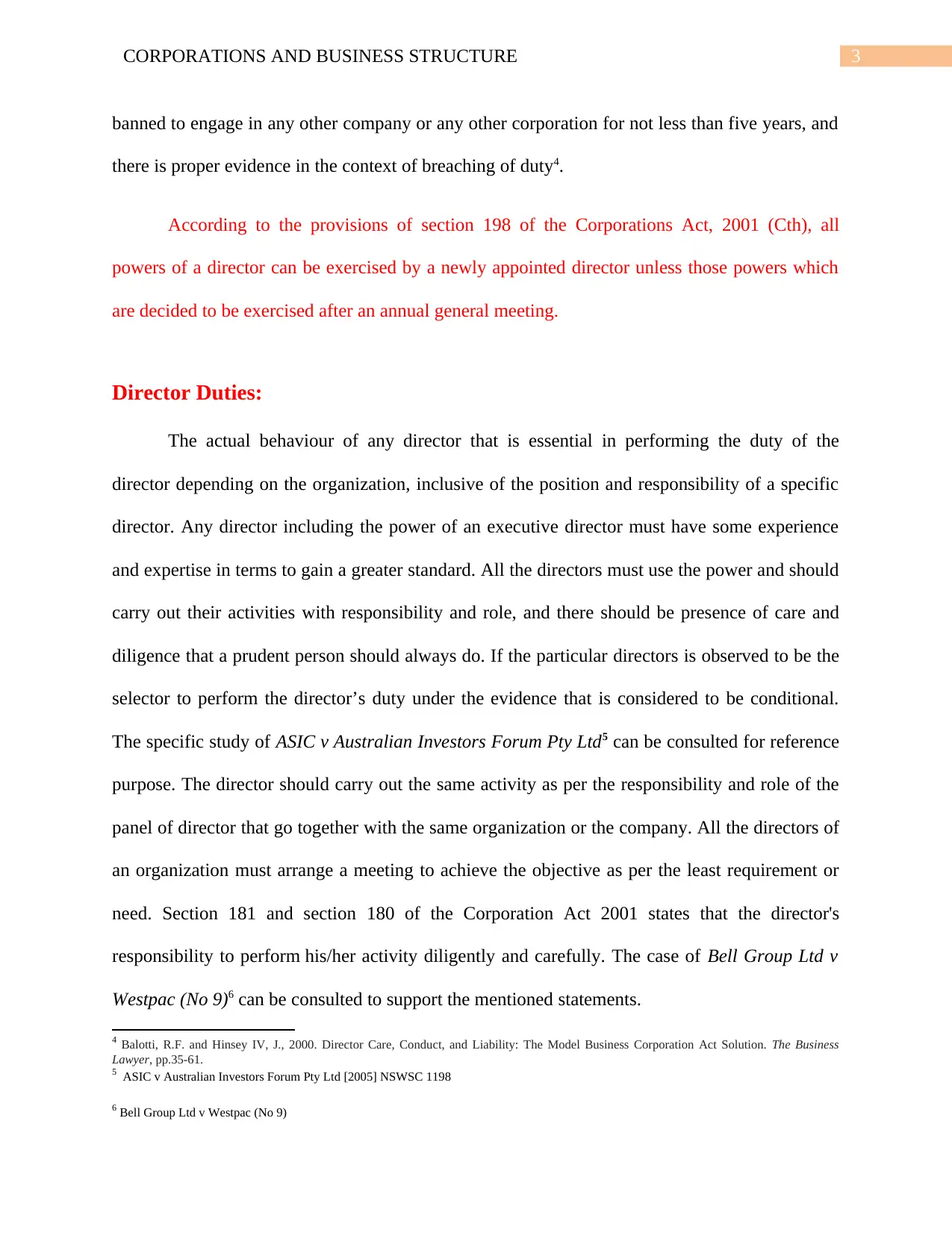
3CORPORATIONS AND BUSINESS STRUCTURE
banned to engage in any other company or any other corporation for not less than five years, and
there is proper evidence in the context of breaching of duty4.
According to the provisions of section 198 of the Corporations Act, 2001 (Cth), all
powers of a director can be exercised by a newly appointed director unless those powers which
are decided to be exercised after an annual general meeting.
Director Duties:
The actual behaviour of any director that is essential in performing the duty of the
director depending on the organization, inclusive of the position and responsibility of a specific
director. Any director including the power of an executive director must have some experience
and expertise in terms to gain a greater standard. All the directors must use the power and should
carry out their activities with responsibility and role, and there should be presence of care and
diligence that a prudent person should always do. If the particular directors is observed to be the
selector to perform the director’s duty under the evidence that is considered to be conditional.
The specific study of ASIC v Australian Investors Forum Pty Ltd5 can be consulted for reference
purpose. The director should carry out the same activity as per the responsibility and role of the
panel of director that go together with the same organization or the company. All the directors of
an organization must arrange a meeting to achieve the objective as per the least requirement or
need. Section 181 and section 180 of the Corporation Act 2001 states that the director's
responsibility to perform his/her activity diligently and carefully. The case of Bell Group Ltd v
Westpac (No 9)6 can be consulted to support the mentioned statements.
4 Balotti, R.F. and Hinsey IV, J., 2000. Director Care, Conduct, and Liability: The Model Business Corporation Act Solution. The Business
Lawyer, pp.35-61.
5 ASIC v Australian Investors Forum Pty Ltd [2005] NSWSC 1198
6 Bell Group Ltd v Westpac (No 9)
banned to engage in any other company or any other corporation for not less than five years, and
there is proper evidence in the context of breaching of duty4.
According to the provisions of section 198 of the Corporations Act, 2001 (Cth), all
powers of a director can be exercised by a newly appointed director unless those powers which
are decided to be exercised after an annual general meeting.
Director Duties:
The actual behaviour of any director that is essential in performing the duty of the
director depending on the organization, inclusive of the position and responsibility of a specific
director. Any director including the power of an executive director must have some experience
and expertise in terms to gain a greater standard. All the directors must use the power and should
carry out their activities with responsibility and role, and there should be presence of care and
diligence that a prudent person should always do. If the particular directors is observed to be the
selector to perform the director’s duty under the evidence that is considered to be conditional.
The specific study of ASIC v Australian Investors Forum Pty Ltd5 can be consulted for reference
purpose. The director should carry out the same activity as per the responsibility and role of the
panel of director that go together with the same organization or the company. All the directors of
an organization must arrange a meeting to achieve the objective as per the least requirement or
need. Section 181 and section 180 of the Corporation Act 2001 states that the director's
responsibility to perform his/her activity diligently and carefully. The case of Bell Group Ltd v
Westpac (No 9)6 can be consulted to support the mentioned statements.
4 Balotti, R.F. and Hinsey IV, J., 2000. Director Care, Conduct, and Liability: The Model Business Corporation Act Solution. The Business
Lawyer, pp.35-61.
5 ASIC v Australian Investors Forum Pty Ltd [2005] NSWSC 1198
6 Bell Group Ltd v Westpac (No 9)
Paraphrase This Document
Need a fresh take? Get an instant paraphrase of this document with our AI Paraphraser
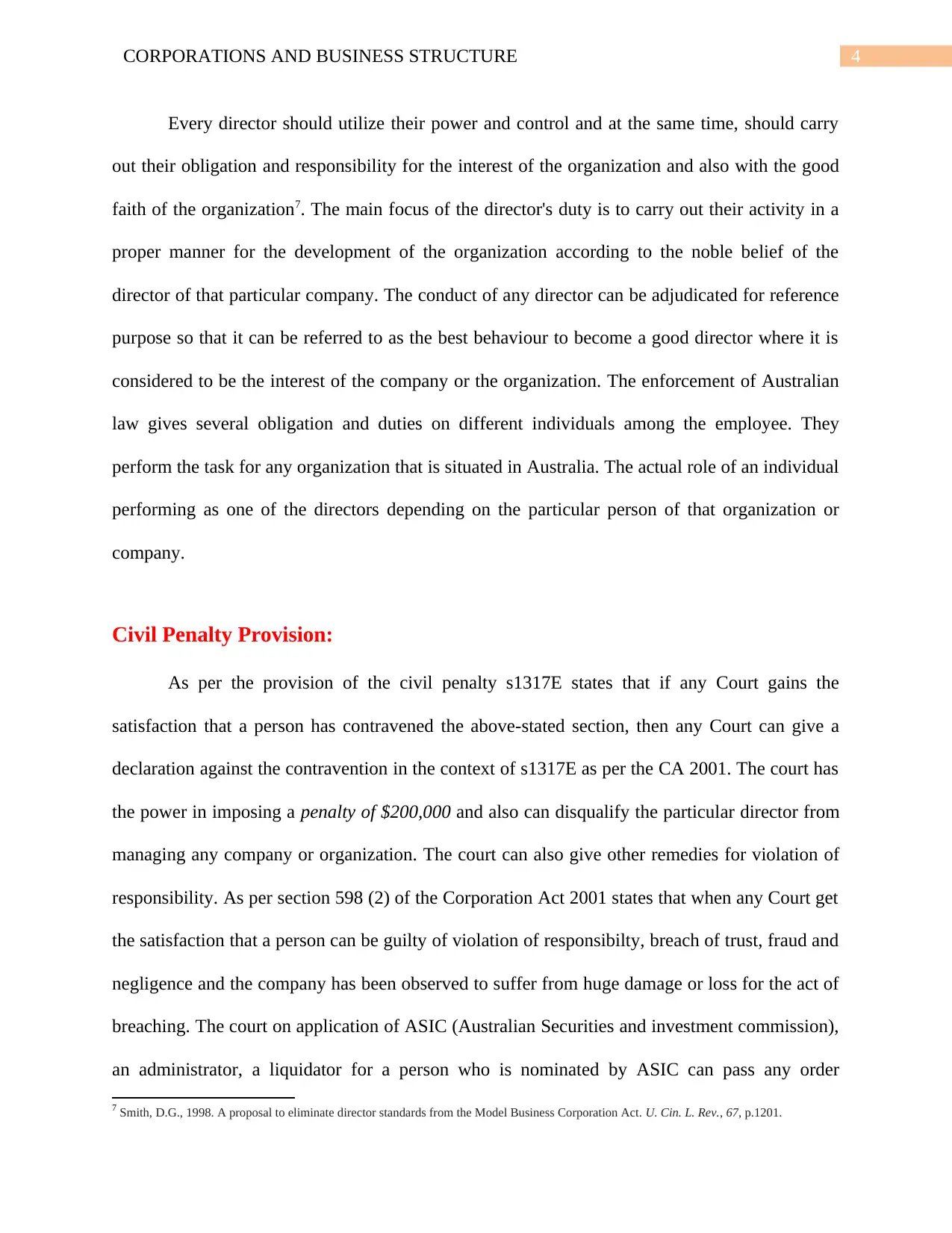
4CORPORATIONS AND BUSINESS STRUCTURE
Every director should utilize their power and control and at the same time, should carry
out their obligation and responsibility for the interest of the organization and also with the good
faith of the organization7. The main focus of the director's duty is to carry out their activity in a
proper manner for the development of the organization according to the noble belief of the
director of that particular company. The conduct of any director can be adjudicated for reference
purpose so that it can be referred to as the best behaviour to become a good director where it is
considered to be the interest of the company or the organization. The enforcement of Australian
law gives several obligation and duties on different individuals among the employee. They
perform the task for any organization that is situated in Australia. The actual role of an individual
performing as one of the directors depending on the particular person of that organization or
company.
Civil Penalty Provision:
As per the provision of the civil penalty s1317E states that if any Court gains the
satisfaction that a person has contravened the above-stated section, then any Court can give a
declaration against the contravention in the context of s1317E as per the CA 2001. The court has
the power in imposing a penalty of $200,000 and also can disqualify the particular director from
managing any company or organization. The court can also give other remedies for violation of
responsibility. As per section 598 (2) of the Corporation Act 2001 states that when any Court get
the satisfaction that a person can be guilty of violation of responsibilty, breach of trust, fraud and
negligence and the company has been observed to suffer from huge damage or loss for the act of
breaching. The court on application of ASIC (Australian Securities and investment commission),
an administrator, a liquidator for a person who is nominated by ASIC can pass any order
7 Smith, D.G., 1998. A proposal to eliminate director standards from the Model Business Corporation Act. U. Cin. L. Rev., 67, p.1201.
Every director should utilize their power and control and at the same time, should carry
out their obligation and responsibility for the interest of the organization and also with the good
faith of the organization7. The main focus of the director's duty is to carry out their activity in a
proper manner for the development of the organization according to the noble belief of the
director of that particular company. The conduct of any director can be adjudicated for reference
purpose so that it can be referred to as the best behaviour to become a good director where it is
considered to be the interest of the company or the organization. The enforcement of Australian
law gives several obligation and duties on different individuals among the employee. They
perform the task for any organization that is situated in Australia. The actual role of an individual
performing as one of the directors depending on the particular person of that organization or
company.
Civil Penalty Provision:
As per the provision of the civil penalty s1317E states that if any Court gains the
satisfaction that a person has contravened the above-stated section, then any Court can give a
declaration against the contravention in the context of s1317E as per the CA 2001. The court has
the power in imposing a penalty of $200,000 and also can disqualify the particular director from
managing any company or organization. The court can also give other remedies for violation of
responsibility. As per section 598 (2) of the Corporation Act 2001 states that when any Court get
the satisfaction that a person can be guilty of violation of responsibilty, breach of trust, fraud and
negligence and the company has been observed to suffer from huge damage or loss for the act of
breaching. The court on application of ASIC (Australian Securities and investment commission),
an administrator, a liquidator for a person who is nominated by ASIC can pass any order
7 Smith, D.G., 1998. A proposal to eliminate director standards from the Model Business Corporation Act. U. Cin. L. Rev., 67, p.1201.
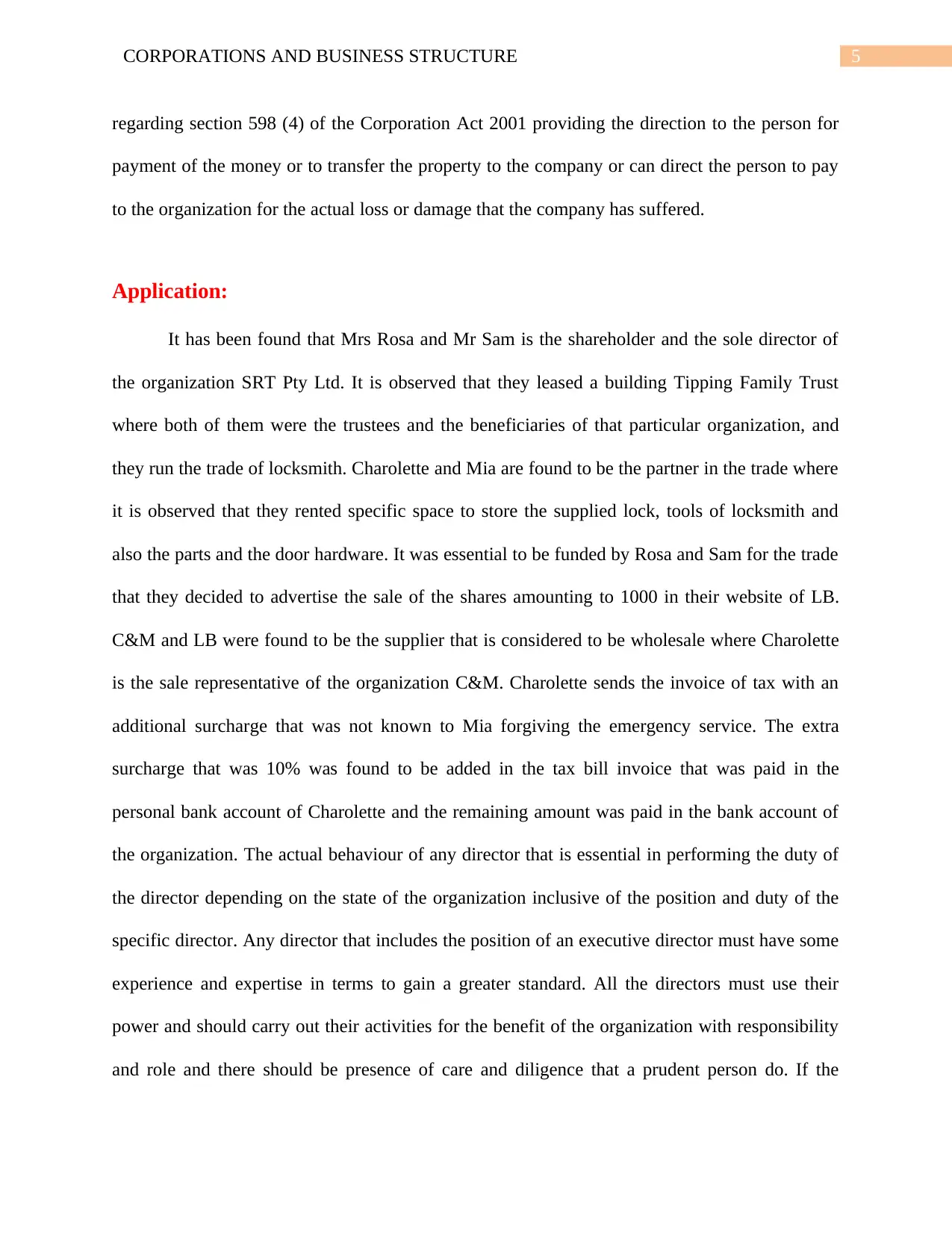
5CORPORATIONS AND BUSINESS STRUCTURE
regarding section 598 (4) of the Corporation Act 2001 providing the direction to the person for
payment of the money or to transfer the property to the company or can direct the person to pay
to the organization for the actual loss or damage that the company has suffered.
Application:
It has been found that Mrs Rosa and Mr Sam is the shareholder and the sole director of
the organization SRT Pty Ltd. It is observed that they leased a building Tipping Family Trust
where both of them were the trustees and the beneficiaries of that particular organization, and
they run the trade of locksmith. Charolette and Mia are found to be the partner in the trade where
it is observed that they rented specific space to store the supplied lock, tools of locksmith and
also the parts and the door hardware. It was essential to be funded by Rosa and Sam for the trade
that they decided to advertise the sale of the shares amounting to 1000 in their website of LB.
C&M and LB were found to be the supplier that is considered to be wholesale where Charolette
is the sale representative of the organization C&M. Charolette sends the invoice of tax with an
additional surcharge that was not known to Mia forgiving the emergency service. The extra
surcharge that was 10% was found to be added in the tax bill invoice that was paid in the
personal bank account of Charolette and the remaining amount was paid in the bank account of
the organization. The actual behaviour of any director that is essential in performing the duty of
the director depending on the state of the organization inclusive of the position and duty of the
specific director. Any director that includes the position of an executive director must have some
experience and expertise in terms to gain a greater standard. All the directors must use their
power and should carry out their activities for the benefit of the organization with responsibility
and role and there should be presence of care and diligence that a prudent person do. If the
regarding section 598 (4) of the Corporation Act 2001 providing the direction to the person for
payment of the money or to transfer the property to the company or can direct the person to pay
to the organization for the actual loss or damage that the company has suffered.
Application:
It has been found that Mrs Rosa and Mr Sam is the shareholder and the sole director of
the organization SRT Pty Ltd. It is observed that they leased a building Tipping Family Trust
where both of them were the trustees and the beneficiaries of that particular organization, and
they run the trade of locksmith. Charolette and Mia are found to be the partner in the trade where
it is observed that they rented specific space to store the supplied lock, tools of locksmith and
also the parts and the door hardware. It was essential to be funded by Rosa and Sam for the trade
that they decided to advertise the sale of the shares amounting to 1000 in their website of LB.
C&M and LB were found to be the supplier that is considered to be wholesale where Charolette
is the sale representative of the organization C&M. Charolette sends the invoice of tax with an
additional surcharge that was not known to Mia forgiving the emergency service. The extra
surcharge that was 10% was found to be added in the tax bill invoice that was paid in the
personal bank account of Charolette and the remaining amount was paid in the bank account of
the organization. The actual behaviour of any director that is essential in performing the duty of
the director depending on the state of the organization inclusive of the position and duty of the
specific director. Any director that includes the position of an executive director must have some
experience and expertise in terms to gain a greater standard. All the directors must use their
power and should carry out their activities for the benefit of the organization with responsibility
and role and there should be presence of care and diligence that a prudent person do. If the
⊘ This is a preview!⊘
Do you want full access?
Subscribe today to unlock all pages.

Trusted by 1+ million students worldwide
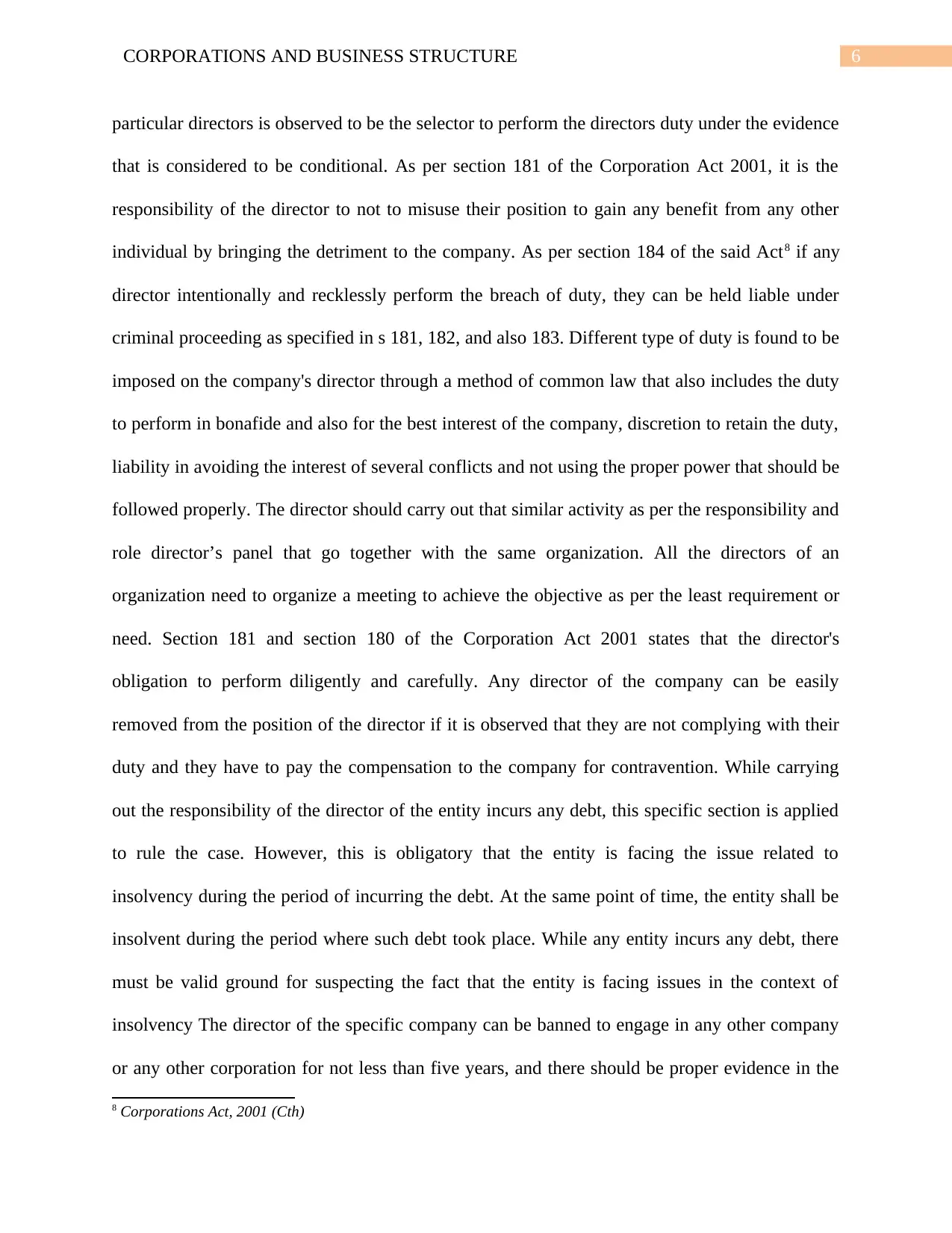
6CORPORATIONS AND BUSINESS STRUCTURE
particular directors is observed to be the selector to perform the directors duty under the evidence
that is considered to be conditional. As per section 181 of the Corporation Act 2001, it is the
responsibility of the director to not to misuse their position to gain any benefit from any other
individual by bringing the detriment to the company. As per section 184 of the said Act8 if any
director intentionally and recklessly perform the breach of duty, they can be held liable under
criminal proceeding as specified in s 181, 182, and also 183. Different type of duty is found to be
imposed on the company's director through a method of common law that also includes the duty
to perform in bonafide and also for the best interest of the company, discretion to retain the duty,
liability in avoiding the interest of several conflicts and not using the proper power that should be
followed properly. The director should carry out that similar activity as per the responsibility and
role director’s panel that go together with the same organization. All the directors of an
organization need to organize a meeting to achieve the objective as per the least requirement or
need. Section 181 and section 180 of the Corporation Act 2001 states that the director's
obligation to perform diligently and carefully. Any director of the company can be easily
removed from the position of the director if it is observed that they are not complying with their
duty and they have to pay the compensation to the company for contravention. While carrying
out the responsibility of the director of the entity incurs any debt, this specific section is applied
to rule the case. However, this is obligatory that the entity is facing the issue related to
insolvency during the period of incurring the debt. At the same point of time, the entity shall be
insolvent during the period where such debt took place. While any entity incurs any debt, there
must be valid ground for suspecting the fact that the entity is facing issues in the context of
insolvency The director of the specific company can be banned to engage in any other company
or any other corporation for not less than five years, and there should be proper evidence in the
8 Corporations Act, 2001 (Cth)
particular directors is observed to be the selector to perform the directors duty under the evidence
that is considered to be conditional. As per section 181 of the Corporation Act 2001, it is the
responsibility of the director to not to misuse their position to gain any benefit from any other
individual by bringing the detriment to the company. As per section 184 of the said Act8 if any
director intentionally and recklessly perform the breach of duty, they can be held liable under
criminal proceeding as specified in s 181, 182, and also 183. Different type of duty is found to be
imposed on the company's director through a method of common law that also includes the duty
to perform in bonafide and also for the best interest of the company, discretion to retain the duty,
liability in avoiding the interest of several conflicts and not using the proper power that should be
followed properly. The director should carry out that similar activity as per the responsibility and
role director’s panel that go together with the same organization. All the directors of an
organization need to organize a meeting to achieve the objective as per the least requirement or
need. Section 181 and section 180 of the Corporation Act 2001 states that the director's
obligation to perform diligently and carefully. Any director of the company can be easily
removed from the position of the director if it is observed that they are not complying with their
duty and they have to pay the compensation to the company for contravention. While carrying
out the responsibility of the director of the entity incurs any debt, this specific section is applied
to rule the case. However, this is obligatory that the entity is facing the issue related to
insolvency during the period of incurring the debt. At the same point of time, the entity shall be
insolvent during the period where such debt took place. While any entity incurs any debt, there
must be valid ground for suspecting the fact that the entity is facing issues in the context of
insolvency The director of the specific company can be banned to engage in any other company
or any other corporation for not less than five years, and there should be proper evidence in the
8 Corporations Act, 2001 (Cth)
Paraphrase This Document
Need a fresh take? Get an instant paraphrase of this document with our AI Paraphraser
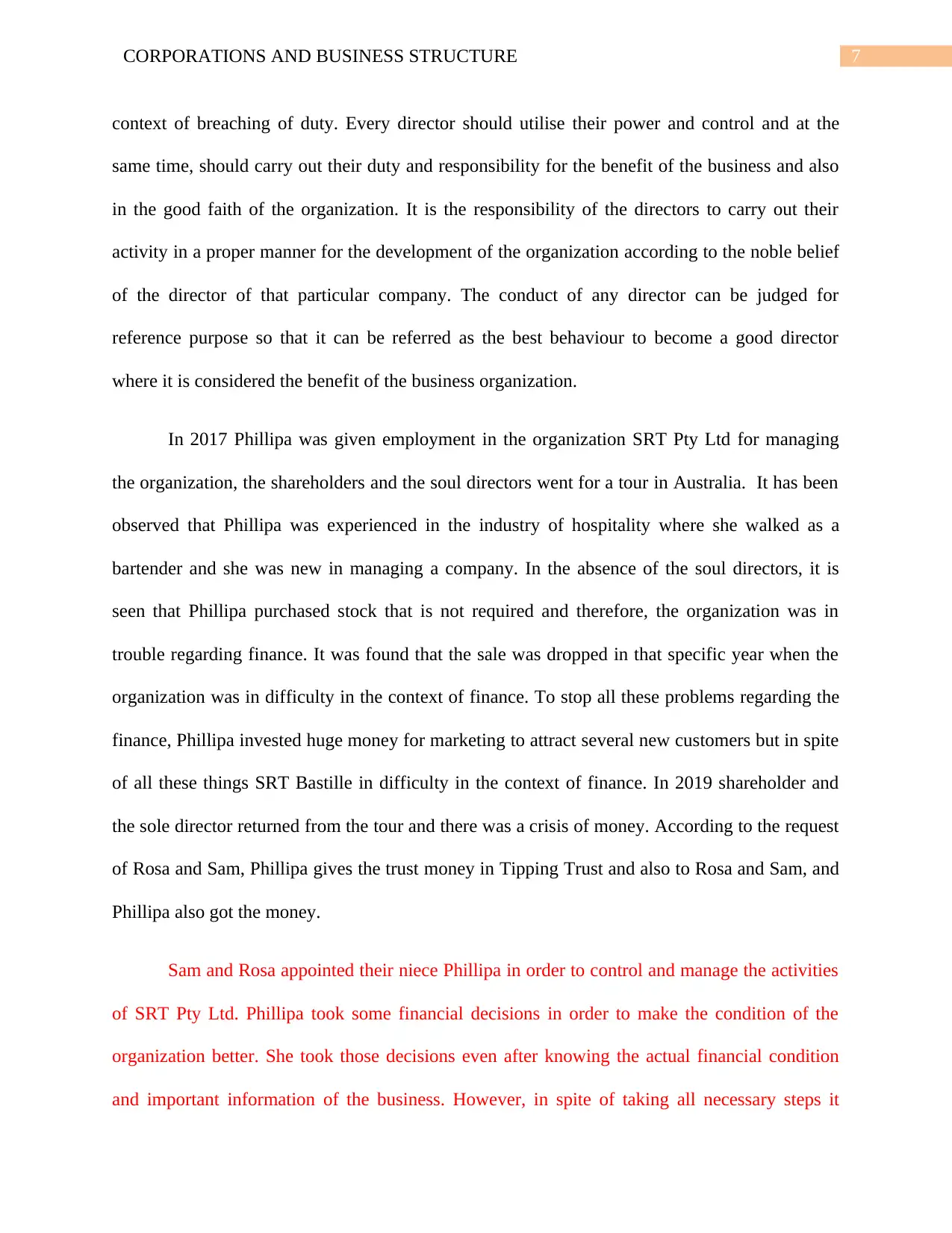
7CORPORATIONS AND BUSINESS STRUCTURE
context of breaching of duty. Every director should utilise their power and control and at the
same time, should carry out their duty and responsibility for the benefit of the business and also
in the good faith of the organization. It is the responsibility of the directors to carry out their
activity in a proper manner for the development of the organization according to the noble belief
of the director of that particular company. The conduct of any director can be judged for
reference purpose so that it can be referred as the best behaviour to become a good director
where it is considered the benefit of the business organization.
In 2017 Phillipa was given employment in the organization SRT Pty Ltd for managing
the organization, the shareholders and the soul directors went for a tour in Australia. It has been
observed that Phillipa was experienced in the industry of hospitality where she walked as a
bartender and she was new in managing a company. In the absence of the soul directors, it is
seen that Phillipa purchased stock that is not required and therefore, the organization was in
trouble regarding finance. It was found that the sale was dropped in that specific year when the
organization was in difficulty in the context of finance. To stop all these problems regarding the
finance, Phillipa invested huge money for marketing to attract several new customers but in spite
of all these things SRT Bastille in difficulty in the context of finance. In 2019 shareholder and
the sole director returned from the tour and there was a crisis of money. According to the request
of Rosa and Sam, Phillipa gives the trust money in Tipping Trust and also to Rosa and Sam, and
Phillipa also got the money.
Sam and Rosa appointed their niece Phillipa in order to control and manage the activities
of SRT Pty Ltd. Phillipa took some financial decisions in order to make the condition of the
organization better. She took those decisions even after knowing the actual financial condition
and important information of the business. However, in spite of taking all necessary steps it
context of breaching of duty. Every director should utilise their power and control and at the
same time, should carry out their duty and responsibility for the benefit of the business and also
in the good faith of the organization. It is the responsibility of the directors to carry out their
activity in a proper manner for the development of the organization according to the noble belief
of the director of that particular company. The conduct of any director can be judged for
reference purpose so that it can be referred as the best behaviour to become a good director
where it is considered the benefit of the business organization.
In 2017 Phillipa was given employment in the organization SRT Pty Ltd for managing
the organization, the shareholders and the soul directors went for a tour in Australia. It has been
observed that Phillipa was experienced in the industry of hospitality where she walked as a
bartender and she was new in managing a company. In the absence of the soul directors, it is
seen that Phillipa purchased stock that is not required and therefore, the organization was in
trouble regarding finance. It was found that the sale was dropped in that specific year when the
organization was in difficulty in the context of finance. To stop all these problems regarding the
finance, Phillipa invested huge money for marketing to attract several new customers but in spite
of all these things SRT Bastille in difficulty in the context of finance. In 2019 shareholder and
the sole director returned from the tour and there was a crisis of money. According to the request
of Rosa and Sam, Phillipa gives the trust money in Tipping Trust and also to Rosa and Sam, and
Phillipa also got the money.
Sam and Rosa appointed their niece Phillipa in order to control and manage the activities
of SRT Pty Ltd. Phillipa took some financial decisions in order to make the condition of the
organization better. She took those decisions even after knowing the actual financial condition
and important information of the business. However, in spite of taking all necessary steps it
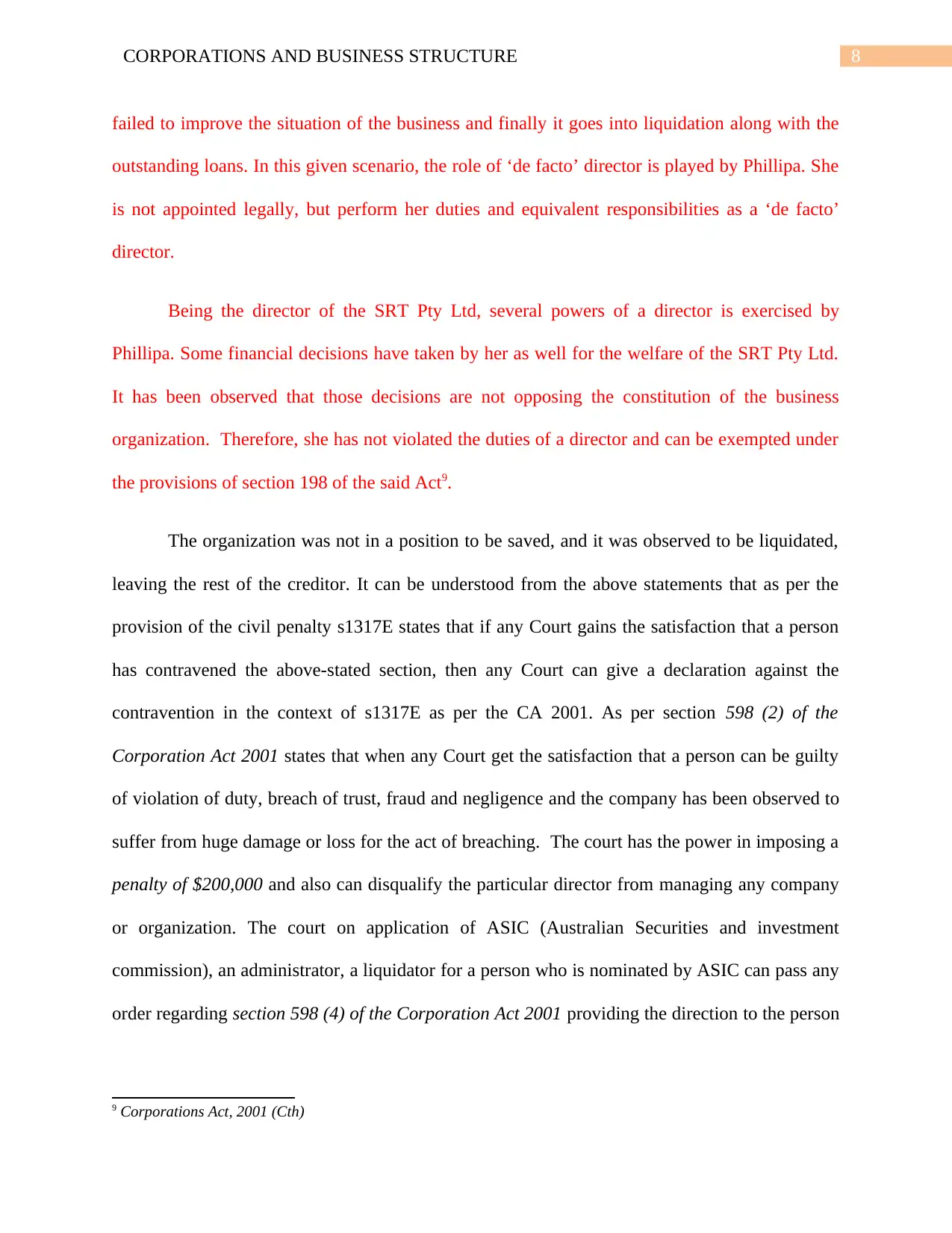
8CORPORATIONS AND BUSINESS STRUCTURE
failed to improve the situation of the business and finally it goes into liquidation along with the
outstanding loans. In this given scenario, the role of ‘de facto’ director is played by Phillipa. She
is not appointed legally, but perform her duties and equivalent responsibilities as a ‘de facto’
director.
Being the director of the SRT Pty Ltd, several powers of a director is exercised by
Phillipa. Some financial decisions have taken by her as well for the welfare of the SRT Pty Ltd.
It has been observed that those decisions are not opposing the constitution of the business
organization. Therefore, she has not violated the duties of a director and can be exempted under
the provisions of section 198 of the said Act9.
The organization was not in a position to be saved, and it was observed to be liquidated,
leaving the rest of the creditor. It can be understood from the above statements that as per the
provision of the civil penalty s1317E states that if any Court gains the satisfaction that a person
has contravened the above-stated section, then any Court can give a declaration against the
contravention in the context of s1317E as per the CA 2001. As per section 598 (2) of the
Corporation Act 2001 states that when any Court get the satisfaction that a person can be guilty
of violation of duty, breach of trust, fraud and negligence and the company has been observed to
suffer from huge damage or loss for the act of breaching. The court has the power in imposing a
penalty of $200,000 and also can disqualify the particular director from managing any company
or organization. The court on application of ASIC (Australian Securities and investment
commission), an administrator, a liquidator for a person who is nominated by ASIC can pass any
order regarding section 598 (4) of the Corporation Act 2001 providing the direction to the person
9 Corporations Act, 2001 (Cth)
failed to improve the situation of the business and finally it goes into liquidation along with the
outstanding loans. In this given scenario, the role of ‘de facto’ director is played by Phillipa. She
is not appointed legally, but perform her duties and equivalent responsibilities as a ‘de facto’
director.
Being the director of the SRT Pty Ltd, several powers of a director is exercised by
Phillipa. Some financial decisions have taken by her as well for the welfare of the SRT Pty Ltd.
It has been observed that those decisions are not opposing the constitution of the business
organization. Therefore, she has not violated the duties of a director and can be exempted under
the provisions of section 198 of the said Act9.
The organization was not in a position to be saved, and it was observed to be liquidated,
leaving the rest of the creditor. It can be understood from the above statements that as per the
provision of the civil penalty s1317E states that if any Court gains the satisfaction that a person
has contravened the above-stated section, then any Court can give a declaration against the
contravention in the context of s1317E as per the CA 2001. As per section 598 (2) of the
Corporation Act 2001 states that when any Court get the satisfaction that a person can be guilty
of violation of duty, breach of trust, fraud and negligence and the company has been observed to
suffer from huge damage or loss for the act of breaching. The court has the power in imposing a
penalty of $200,000 and also can disqualify the particular director from managing any company
or organization. The court on application of ASIC (Australian Securities and investment
commission), an administrator, a liquidator for a person who is nominated by ASIC can pass any
order regarding section 598 (4) of the Corporation Act 2001 providing the direction to the person
9 Corporations Act, 2001 (Cth)
⊘ This is a preview!⊘
Do you want full access?
Subscribe today to unlock all pages.

Trusted by 1+ million students worldwide
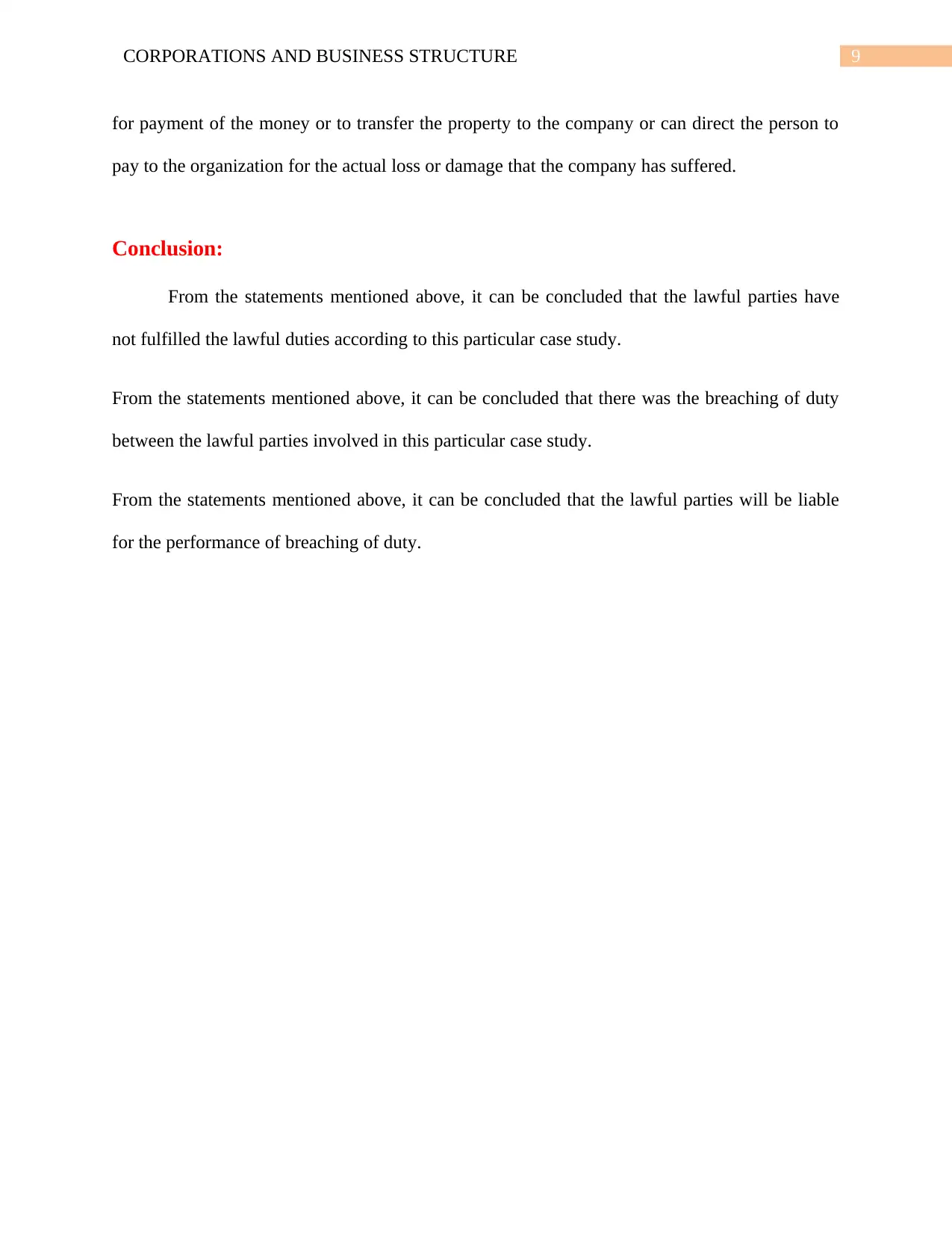
9CORPORATIONS AND BUSINESS STRUCTURE
for payment of the money or to transfer the property to the company or can direct the person to
pay to the organization for the actual loss or damage that the company has suffered.
Conclusion:
From the statements mentioned above, it can be concluded that the lawful parties have
not fulfilled the lawful duties according to this particular case study.
From the statements mentioned above, it can be concluded that there was the breaching of duty
between the lawful parties involved in this particular case study.
From the statements mentioned above, it can be concluded that the lawful parties will be liable
for the performance of breaching of duty.
for payment of the money or to transfer the property to the company or can direct the person to
pay to the organization for the actual loss or damage that the company has suffered.
Conclusion:
From the statements mentioned above, it can be concluded that the lawful parties have
not fulfilled the lawful duties according to this particular case study.
From the statements mentioned above, it can be concluded that there was the breaching of duty
between the lawful parties involved in this particular case study.
From the statements mentioned above, it can be concluded that the lawful parties will be liable
for the performance of breaching of duty.
Paraphrase This Document
Need a fresh take? Get an instant paraphrase of this document with our AI Paraphraser
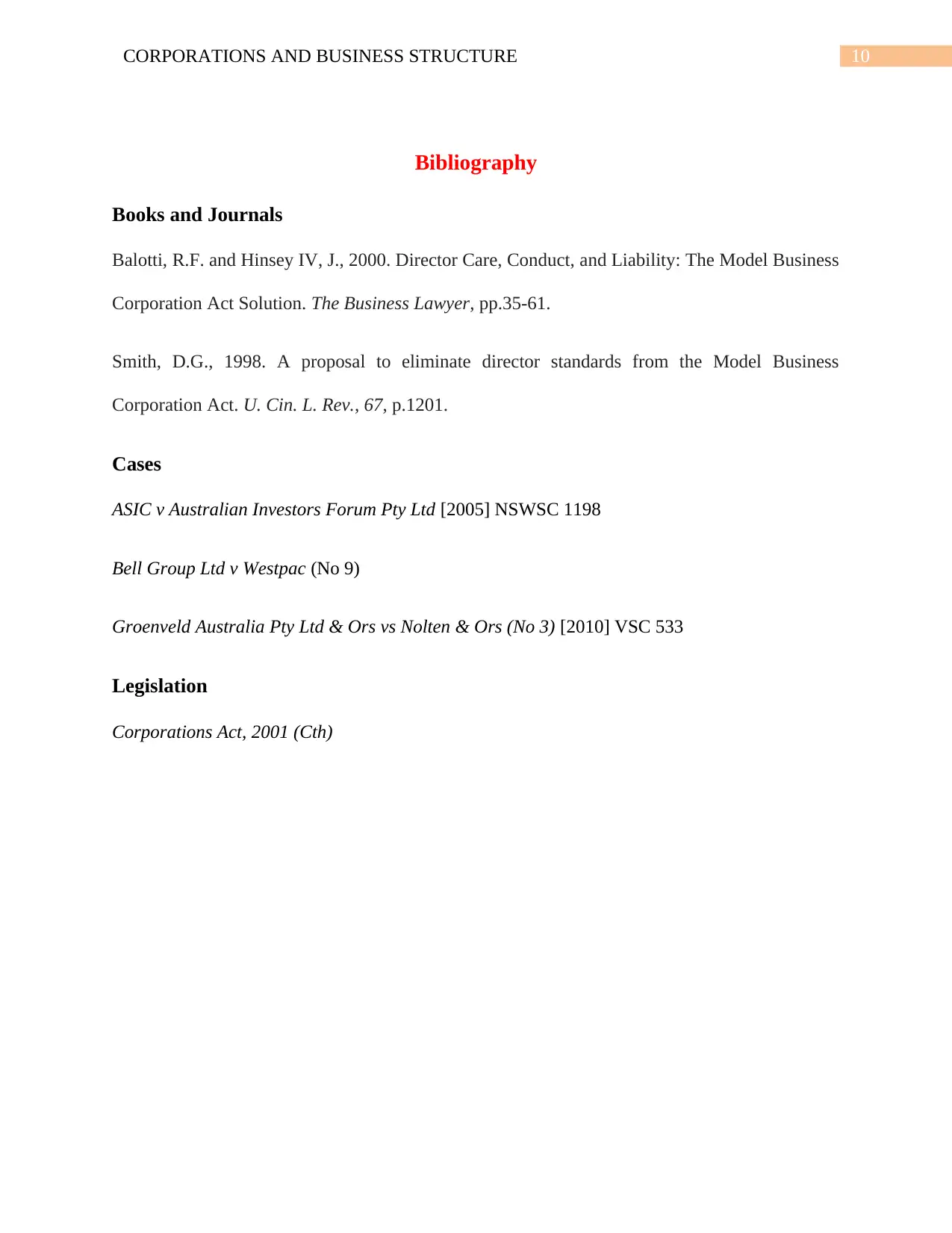
10CORPORATIONS AND BUSINESS STRUCTURE
Bibliography
Books and Journals
Balotti, R.F. and Hinsey IV, J., 2000. Director Care, Conduct, and Liability: The Model Business
Corporation Act Solution. The Business Lawyer, pp.35-61.
Smith, D.G., 1998. A proposal to eliminate director standards from the Model Business
Corporation Act. U. Cin. L. Rev., 67, p.1201.
Cases
ASIC v Australian Investors Forum Pty Ltd [2005] NSWSC 1198
Bell Group Ltd v Westpac (No 9)
Groenveld Australia Pty Ltd & Ors vs Nolten & Ors (No 3) [2010] VSC 533
Legislation
Corporations Act, 2001 (Cth)
Bibliography
Books and Journals
Balotti, R.F. and Hinsey IV, J., 2000. Director Care, Conduct, and Liability: The Model Business
Corporation Act Solution. The Business Lawyer, pp.35-61.
Smith, D.G., 1998. A proposal to eliminate director standards from the Model Business
Corporation Act. U. Cin. L. Rev., 67, p.1201.
Cases
ASIC v Australian Investors Forum Pty Ltd [2005] NSWSC 1198
Bell Group Ltd v Westpac (No 9)
Groenveld Australia Pty Ltd & Ors vs Nolten & Ors (No 3) [2010] VSC 533
Legislation
Corporations Act, 2001 (Cth)
1 out of 11
Related Documents
Your All-in-One AI-Powered Toolkit for Academic Success.
+13062052269
info@desklib.com
Available 24*7 on WhatsApp / Email
![[object Object]](/_next/static/media/star-bottom.7253800d.svg)
Unlock your academic potential
Copyright © 2020–2026 A2Z Services. All Rights Reserved. Developed and managed by ZUCOL.




